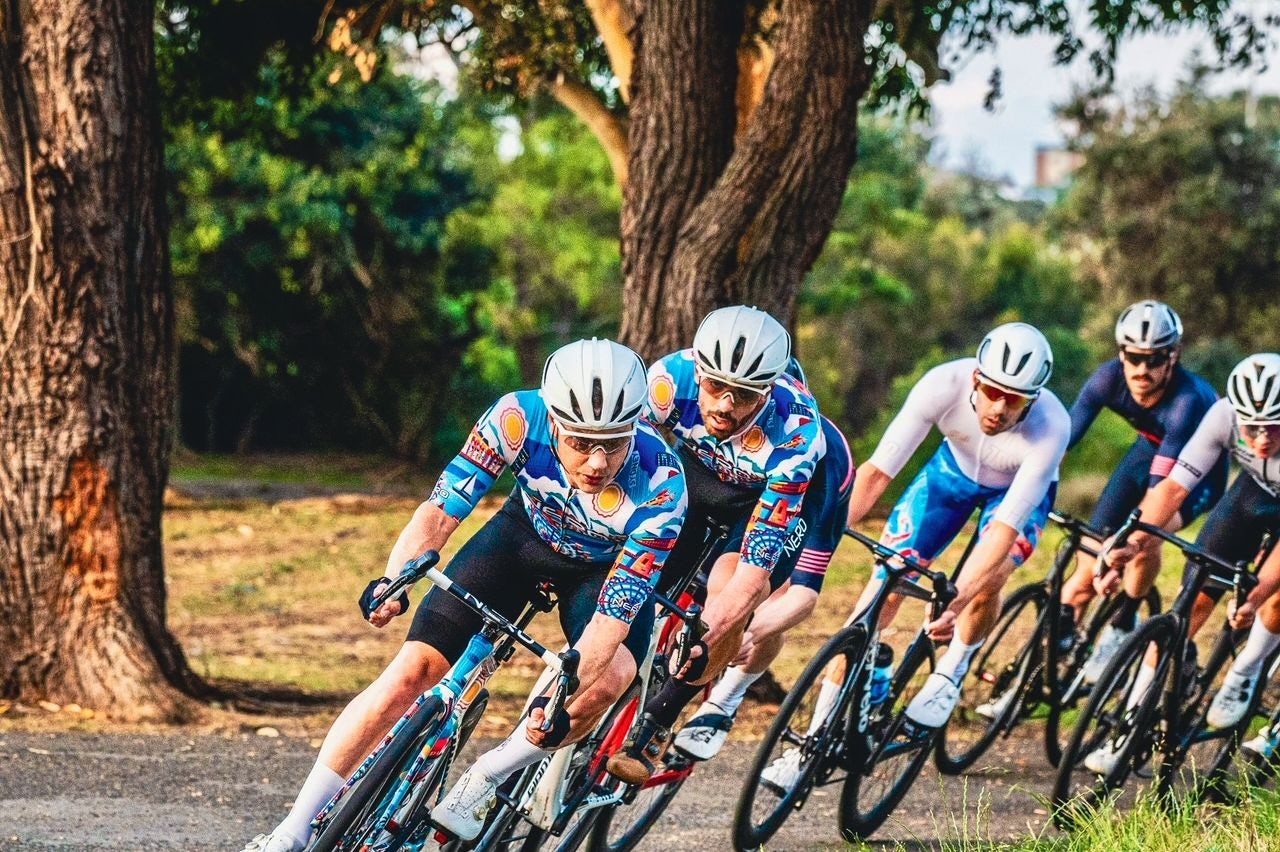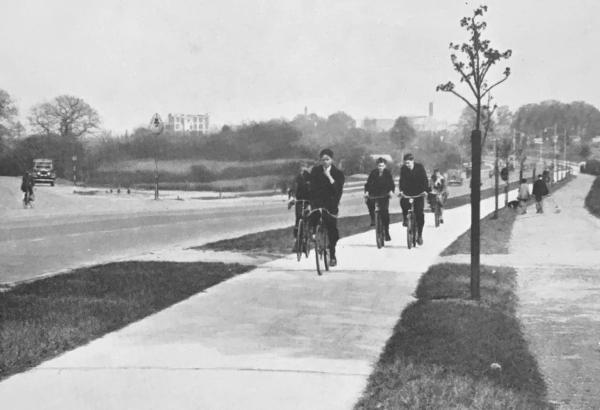‘The fact that anyone was watching was bizarre’ - Chris Miller on YouTube success
Chris Miller is a name that's spread from the local Sydney crit league to the rest of the world. We spoke to him to find out more
James Howell-Jones
Junior Writer
© Chris Miller
Chris Miller and Jesse Coyle riding in Sydney
Chris Miller is an amateur cyclist from Sydney. He’s one of many nearly-pros all over the world, but in recent months, he’s emerged from the crowd, and is quickly becoming one of the loudest voices within cycling.
Every week, Miller produces an episode of the Nero Show, an hour-long conversation between himself and friend and teammate Jesse Coyle. It’s a simple thing; the two amateur racers sit together and have the kind of conversation they’d otherwise have at a mid-ride cafe stop, or whilst riding laps of Centennial Park, their local training loop.
They label their conversation ‘unfiltered’ – a nod to the healthy scepticism that anchors the tone, and to the shoot-from-the-hip conjecture that powers the debate. But Coyle and Miller are not internet cranks with a bent for conspiracy. They’re simply trusting their instinct, and indulging in their opinions. In a cycling media crowd that is obsessively analytical and scientific, it’s actually quite refreshing.
Week by week, they’re dragging the conversation surrounding cycling away from marginal gains and towards something a bit more fun. It’s hard to pinpoint exactly how, but they’ve created something that is clearing more and more space for itself in a busy crowd. We spoke to Miller to find out more to find out more.

© Chris Miller
Nearly-pro Chris Miller is becoming one of the key voices in cycling
GCN: What were you doing before the Nero Show?
Chris Miller: Particularly sort of boring career type stuff. I was living in Ireland when I started getting into corporate bits and pieces, but started working for a company called Film in Schools. It was essentially a digital media promotion project where we'd go to schools and teach the teachers how to use digital media in the classroom. That was my introduction to digital media.
Fast forward a couple of years, moving back to Australia with my wife, I decided I wanted to start a race team, and I wanted to promote it a little bit differently, so created a YouTube channel around it with the idea of giving people insight into the racing that we were doing. And that was where the Nero thing came from and where the YouTube stuff came from, and that gave me a bit of a chance to start using the digital media stuff that I'd been doing in Ireland.
I grew up playing cricket and rugby, club sports. Never touched a bike – probably shouted at people in lycra, didn't even know what they were doing. And slowly sort of started commuting on the bike, then fell in with a crowd of triathletes in Dublin.
When I moved back to Australia, I started pinning a number on in some lower grade things, and discovered I wasn't half bad at it. And then as the race team developed and my training kind of ramped up and ramped up. So I've got to the top end of the local stuff and started racing nationally and eventually some of the UCI stuff.
How did you meet Jesse?
He was a teammate. Then he was a rival and then he was a teammate again. He lived quite close to me, and as you tend to do, you start to train with people who are around you doing similar things. He was racing for the same club that I raced for. He was like a bazillion times more talented than me and obviously much younger.
And he was picked up by a semi professional team here in Australia, and was well on the way to potentially sort of a WorldTour type thing. But we always trained together or when I could keep up with him. But when that had run its course from his perspective, Nero was still going and he came back to the team, to Nero.
He'd finished his studies, so he became a professional coach and he, myself, and another friend of mine, Luke, became the management of Nero. So that's really where our friendship became a little bit more sort of intense in the sense that we were working together quite closely with the team stuff, and shared a lot of similar values with how a team should be, the kind of no-nonsense attitude to racing and to riding.
And I suppose taking that to the next step, he wanted to start promoting his coaching a little bit more. He started his own YouTube channel, which I thought was hilarious because when I first met him, if I ever pulled the camera out, he would shy away and say, ‘oh, a camera, don't want to talk to that,’ and here he was starting a YouTube channel.
How did you start the Nero Show?
For different reasons the team ended. So as far as the direction of my YouTube channel, I really could sort of step back and go, ‘right, what am I doing with this?’
Because I'd never really paid any attention to it. It was always just a thing that ticked along in the background with the team. So I was starting to think, ‘I'll just throw some ideas at the wall and see what sticks’.
And one of those ideas was just really simple. The two of us were riding and we were just having the same sort of chat that we have on the show. And we were like, ‘this discussion doesn't exist. We don't see this chat on any of the stuff that we watch on YouTube.’
Honestly, it was as simple as that. We just felt that the discussion that people were having at cafes or in the bunches wasn't necessarily being had in a show-long form format, and we thought we're just going to press record and, and go for it. That's honestly where it all came from.
What was the early uptake like?
We didn't really have any expectations because it was just two guys sitting down talking bikes, so the fact that anyone was watching was bizarre. There did seem to be a constant theme of, ‘oh, thank God, thank God someone's talking about the type of things we're talking about and there doesn't seem to be any strings attached to the type of stuff that was being said.’
Now that said, in YouTube being YouTube, there's a good bit of negative out there as there is positive, and that's fine. Kind of comes with the territory of offering your actual opinions all the time. But look, the early production of it was a joke. So the fact that anyone was watching gave us a little bit of inspiration.
A lot of your discussions come back to marketing. Is that intentional, or is that just what happens when you talk about cycling these days?
I do think people are interested in that, because people talk about that idea of, ‘why are we all talking about the new BMC?’ Like, how did this enter our conscience?
In terms of the brand stuff, that fascinates me because I follow the sneaker culture thing a bit. And in a toned down way, that's all I'm doing because ultimately, if you buy a bike or something like that, you are aligning yourself in some way to that brand.
And I'm fascinated by that decision that people make like, why are you choosing that brand? What is it about it that speaks to you? Was it a video you saw of Cam Nichols or GCN doing it, or do you believe in the heritage of it?
And that's the chat people have. You sit there at a cafe and guys are just rattling through the brands, like, what's good, what's bad. And I love how here, at least, people are just so absolute about it, like it's, ‘that bike's a dog’ and ‘that bike's fast’. There's just no middle ground. And we like to giggle at that.
How do you choose topics?
From week to week, we'll basically keep a running folder of topics that we will just add to as the week goes on. But essentially that could just be, we're out riding or I'm out riding and something pops into my head or someone says something to me and I just pop it into my notes folder and it's in there.
So that might bubble away. And then obviously there might be a launch of a product that interests us. That's a little bit different. We're not journalists as such, so we don't tend to do that.
Jesse's a little bit more into the Twitter side of it. So I think he'll kind of pick up more on if there's some sort of Twitter fire happening that needs to be discussed.
But ultimately, every week it’s a shot in the dark, as far as what works. But I think what's interesting is that if we come in and we've got stuff we really want to talk about, because we don't actually get to ride that much together anymore, so if there's a lot of stuff that we would normally talk about if we're out on a ride, that tends to be a good episode, and it tends to work really well with the audience. Whereas when we are both sitting here, staring at each other going, ‘I don't have much, you got much?’ ‘No, I don't have much’, then there tends to be less engagement.
Surprise winner topics?
Every week, to be honest. Even this week, I just had a little note in the folder to talk about, because I had a mechanical that week and I didn't want to call my wife when I had the mechanical, because I knew she’d get stressed et cetera. And this was just like a little note that was one of those ones that was at the bottom of the notes. It's not a big thing. But if you go into the comments of this week's show, that's the topic that everyone's like, ‘Oh yeah, I've done this, I've done that’.
I'm just like, ‘how is that the thing that resonated?’ Whereas all this other stuff, a new brand, the Gravel World Championships. ‘No, not interested in that. Calling someone when you have mechanical? That's what I wanted to talk about.’ Yeah. So honestly, it's every single week it surprises us.
The show revolves around healthy debate. Do you decide between you who’s going to play devil’s advocate?
Yes, sometimes. We're both very aware that even if we both a hundred percent agree with what the other person says, no one just really wants to listen to two people nodding at each other going, ‘yes, great point. Yes, great point.’ We would like to at least offer a bit of an alternative.
And sometimes that's wrapped up in, ‘Oh, let's approach that from a different angle’, or it might be just a full out, ‘I'm going to completely disagree with you for the sake of disagreeing with you.’
That's pretty rare, to be honest with you, because we don't agree on much.
Worst thing about cycling?
As a sport, and I think this is the case in the UK as well, but there's real challenges for any of the amateur racing scene. You've seen it here, a lot of our domestic racing scene has basically disappeared. It's becoming almost impossible to run a race and that's just flowing down now all the way through the grades, the age groups. And we haven't moved into the gravel stuff like they have in the US. That hasn't really taken that mantle yet, so we are really in a holding pattern when it comes to events, just in general.
We've got one next weekend, it's essentially a Fondo or a Grand Fondo. It's one of only two or three left in the country at this point. So that's the biggest challenge at the moment: to just get consistent events happening that get people out riding their bikes competitively, not competitively, whatever it might be.
I think the best part of cycling at the moment is actually some of the online community stuff. To be able, now, to watch crit racing in the US or some of the stuff going on in the UK, like the hill climbing stuff in the UK. It's these whole other worlds of cycling that were completely invisible to us not long ago. And now, I can name you teams in the US crit racing scene, or I can tell you who won a UK hill climb, it's nuts. So I love that, but yeah, just the actual bike racing or riding event stuff, that's a big, big problem.
What are your personal ambitions?
In terms of the next step, I don't think we're anywhere near perfecting what we're doing at the moment. And I do believe that what we're doing is very valuable, whether that be to a brand or a network that wants to get involved. And I think once we nail down what we're doing, continue to be consistent with it, bring in the right guests, and have a bit of diversity, I think we'll be in a good position.










